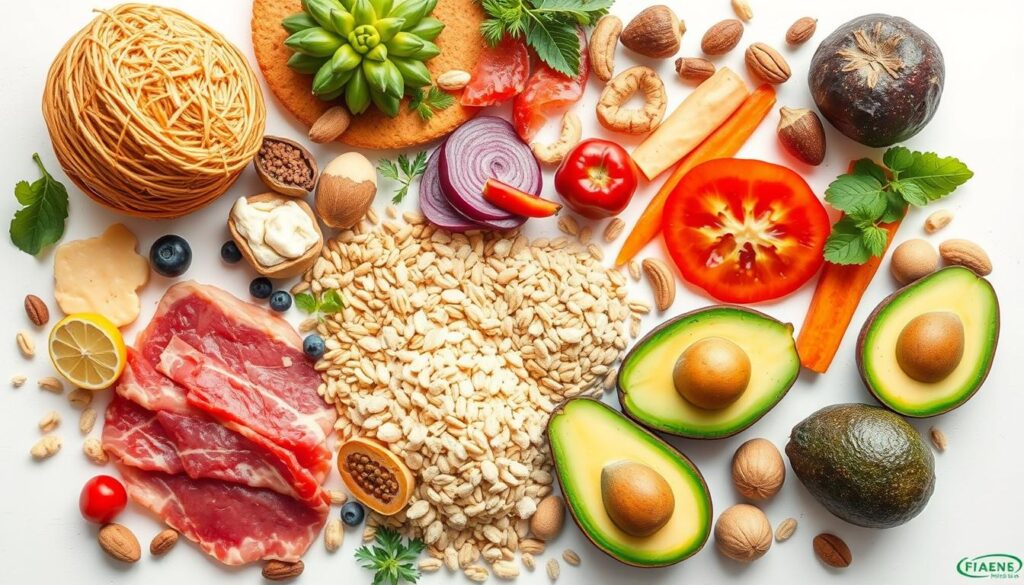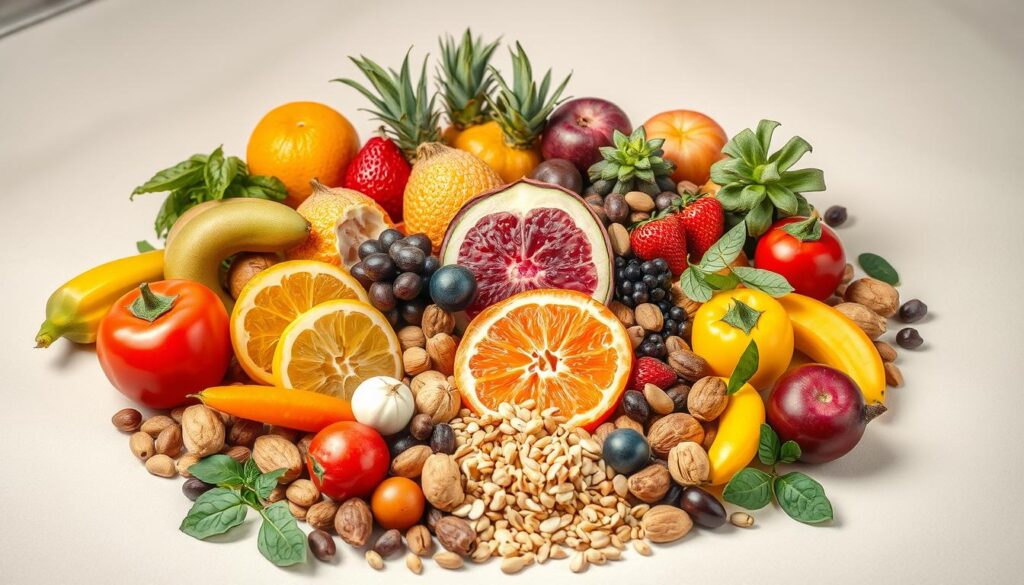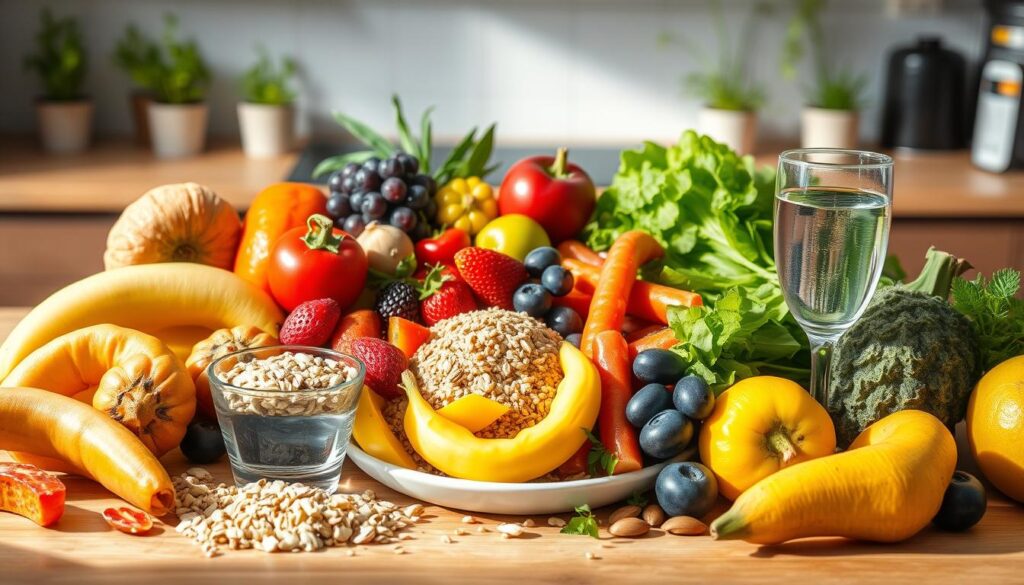Nutrition is key to a healthy life. It’s about what we eat and our body’s needs. Eating well and staying active is the base of health. Without good nutrition, our immune system weakens, and we face more diseases.
It also affects our growth and mental health. Knowing the difference between food and nutrition is important for a better life.
The link between nutrition and health is deep and wide. What we eat and how much we eat affects our health. A diet full of good nutrients helps avoid many diseases.
This includes heart disease, cancer, and diabetes. It also helps keep our minds sharp.
Key Takeaways
- Nutrition is fundamental to living a healthy, well-balanced life.
- Good nutrition, including a balanced diet and regular physical activity, is the foundation of good health.
- Lack of proper nutrition can lead to decreased immune system, increased disease risk, and deterioration of physical and mental growth.
- Nutrition supports growth, development, well-being, and disease prevention.
- Understanding the distinction between food and nutrition is crucial for a healthier lifestyle.
Understanding the Foundations of Nutrition
Good health starts with proper nutrition. It gives us the building blocks for growth and keeps our bodies working well. Nutrition is about eating the right foods to stay healthy. This includes a mix of macronutrients (like protein and carbs) and micronutrients (such as vitamins and minerals).
Defining Basic Nutritional Concepts
Foods are what we eat to get nourishment. Nutrition is how we use those nutrients from food. Knowing the difference helps us live healthier. Nutrients give us energy, help our bodies work, and prevent diseases.
The Science Behind Nutrient Absorption
Our bodies have special ways to take in and use nutrients. Good nutrient absorption is key for health. It supports growth, keeps us healthy, and fights off diseases.
Key Components of Healthy Eating
- Balancing macronutrients to meet the body’s specific needs
- Incorporating a variety of fruits and vegetables to ensure a rich supply of micronutrients
- Staying hydrated by making water the primary beverage
- Practicing mindful eating to develop a healthier relationship with food and promote emotional well-being
Eating a balanced diet lowers the risk of diseases like heart disease and diabetes. Knowing about nutrition helps us make better food choices. This supports our health and happiness.
| Nutrient | Function | Food Sources |
|---|---|---|
| Protein | Builds and repairs tissues, provides energy | Lean meats, poultry, fish, eggs, legumes, nuts, and seeds |
| Carbohydrates | Provide energy, fuel the brain and muscles | Whole grains, fruits, vegetables, and legumes |
| Fats | Support cell growth, insulate organs, absorb vitamins | Avocados, nuts, seeds, olive oil, and fatty fish |
“Nutrition is the foundation for optimal health and well-being. A balanced diet rich in nutrient-dense foods can have a profound impact on our physical, mental, and emotional resilience.”
Essential Macronutrients for Optimal Health
Macronutrients are key nutrients our bodies need a lot of to work right. They are carbohydrates, proteins, and fats. Knowing how to balance these is key for staying healthy and feeling good.
Carbohydrates give us 4 calories per gram and are our main energy source. They include sugars, starches, and fibers. We should eat 45-65% of our calories from carbs.
Proteins also give us 4 calories per gram and help build and fix tissues. They also boost our immune system. We should aim for 10-35% of our calories to come from proteins.
Fats give us 9 calories per gram and are vital for hormone production and brain health. They should make up 20-35% of our daily calories.
| Macronutrient | Calories per Gram | Recommended Daily Intake |
|---|---|---|
| Carbohydrates | 4 | 45-65% of total calories |
| Proteins | 4 | 10-35% of total calories |
| Fats | 9 | 20-35% of total calories |
The type of fats we eat matters too. Unsaturated fats are better than saturated fats. Also, water is a macronutrient, making up 60% of our bodies. It’s vital for many body functions.
Finding the right balance of macronutrients is key for health and energy. While tracking macros can help, the main goal is to eat a balanced dietary habit that our bodies need.
The Power of Micronutrients in Body Functions
Macronutrients like proteins, carbs, and fats give us energy and build our bodies. But, micronutrients like vitamins and minerals are key for staying healthy. They are needed in small amounts but are very important.
Vitamins and Their Roles
Vitamins are organic compounds our bodies need to work right. They are split into water-soluble and fat-soluble groups. Water-soluble vitamins like B vitamins and vitamin C are quickly absorbed and then leave the body. Fat-soluble vitamins like A, D, E, and K are stored in fat tissues.
Each vitamin has its own job. Vitamin C protects cells from harm. Vitamin D helps our bones by helping our body use calcium. Getting enough vitamins is key for a strong immune system, energy, and feeling good overall.
Mineral Requirements for Health
Minerals are inorganic elements our bodies need for many functions. Major minerals like calcium, phosphorus, and magnesium are needed in bigger amounts. Trace minerals like iron, zinc, and selenium are needed in smaller amounts.
Minerals do many things in our bodies. They help with fluid balance, bone health, and enzyme work. Eating a balanced diet with enough minerals is important for staying healthy.
Antioxidants and Immune Support
Vitamins and minerals like C and E, and selenium and zinc, are antioxidants. They fight off harmful free radicals. This helps keep our immune system strong.
Eating foods rich in antioxidants helps prevent chronic diseases. It also helps our bodies fight off infections and illnesses. Eating a variety of nutrient-rich foods is key for staying healthy.
Relationship Between Nutrition and Health
The link between nutrition and health is clear. Eating right is key to staying fit, feeling good mentally, and living longer. In the U.S., over half of adults suffer from preventable diseases like heart disease and diabetes. These are often linked to what we eat and how active we are.
These diseases cost a lot in healthcare and hurt our economy. They also make health differences worse and can affect the military. The World Health Organization says eating well and staying active are crucial for staying healthy.
Studies show that eating fruits, veggies, whole grains, nuts, and lean meats helps a lot. It can lower blood pressure, control diabetes, help with weight, ease arthritis, and cut cancer and heart disease risks. On the other hand, bad eating can weaken our immune system, make us more prone to illness, and harm our growth and work performance.
| Nutrient | Health Benefits |
|---|---|
| Proteins | Support muscle growth and repair, maintain healthy skin and hair |
| Carbohydrates | Provide energy for the body, support brain function |
| Fats | Promote heart health, aid in nutrient absorption, maintain cell structure |
| Vitamins | Support immune function, maintain healthy vision, aid in bone growth |
| Minerals | Regulate metabolism, support bone and tooth health, aid in nerve function |
| Water | Maintain hydration, regulate body temperature, support organ function |
Good nutrition is essential for a healthy life. It gives us the nutrients we need for our bodies and minds. By eating well and staying active, we can stay healthy and avoid many diseases.
Impact of Dietary Choices on Physical Well-being
Eating a balanced diet is key to staying healthy. What we eat affects our weight, energy, and disease risk. It’s all about making smart food choices.
Weight Management and Metabolism
Our diet affects our weight and metabolism. Eating whole foods like fruits and lean proteins helps. But, too much processed food can lead to weight gain and slow metabolism.
Energy Levels and Physical Performance
Our diet impacts our energy and how well we perform. The right mix of carbs, proteins, and fats fuels our bodies. This helps us stay active and strong.
Disease Prevention Through Diet
Studies link diet to disease prevention. Eating lots of fruits, veggies, and whole grains lowers heart disease and cancer risk. Healthy eating is a powerful way to stay well.
By focusing on dietary habits, food choices, and healthy eating patterns, we can improve our health. Smart food choices help with weight, energy, and disease prevention.
Mental Health and Nutritional Connection
Research shows a strong link between what we eat and our mental health. Foods rich in omega-3 fatty acids, vitamins, and minerals are key for our brain and mood. For example, omega-3s can boost our mood and may help prevent depression.
Getting enough nutrients helps our brain chemicals work better. This is important for feeling good and thinking clearly. So, eating well is not just for our body but also for our mind.
Studies say eating too little fat can lead to depression. But eating about 65 grams of fat a day is better. Carbs should be 50% of our diet, and protein 15-20% or 50-100 grams for adults.
Mental health issues affect many people. A study found 38% of Europeans had mental health problems in 2019. In Poland, over 1.6 million people got psychiatric help that year.
Eating a balanced diet full of nutrients is a big step for better mental health. It helps us feel emotionally strong and sharp. This makes for a healthier, happier life.
The Role of Hydration in Overall Health
Drinking enough water is key to staying healthy. Water makes up about 60% of our body weight. It helps with many important tasks, like keeping our body temperature right and helping us digest food.
Water’s Function in Body Systems
Water does a lot for us, including:
- Helping us cool down by sweating and evaporating
- Carrying nutrients and oxygen to our cells
- Keeping our joints and organs moving smoothly
- Helping get rid of waste through urine, feces, and sweat
- Keeping our minds sharp and focused
Optimal Hydration Guidelines
How much water we need varies. But most adults should drink 1.5 to 2 liters (8 to 10 cups) daily. This can be from water, other drinks, and foods with lots of water like fruits and veggies. Kids need about 6 to 8 drinks a day. People who exercise a lot might need more water to replace lost fluids.
It’s important to eat a balanced diet and drink enough water. This helps our body work right and boosts our health. By focusing on balanced diet and staying hydrated, we support our body’s needs and feel better overall.
“Staying hydrated is not just about drinking water; it’s about making informed choices about the foods and beverages we consume, and understanding how they impact our overall health and well-being.”
Nutritional Needs Across Life Stages
Proper nutrition is key at every life stage. It gives us the building blocks for growth and development. From infancy to adulthood, dietary habits and nutrient intake are vital for a balanced diet and health.
In childhood and adolescence, proteins are crucial for muscle and tissue growth. Calcium and vitamin D are also key for strong bones. Research shows the first 1,000 days of life are critical for nutrition.
As we get older, our nutritional needs change. Older adults need more vitamin D and vitamin B12. They should also watch their calorie intake to stay healthy.
| Life Stage | Key Nutritional Considerations |
|---|---|
| Infancy and Childhood |
|
| Adolescence |
|
| Adulthood |
|
| Older Adulthood |
|
Knowing the nutritional needs for each life stage helps us make better choices. This supports our health and well-being.
Diet-Related Health Conditions and Prevention
Diet-related health issues are a big problem in the U.S. More than six out of ten adults have at least one chronic disease. About four in ten have two or more. These include heart disease, high blood pressure, type 2 diabetes, and some cancers.
Chronic Disease Management
Nutrition is key in managing and preventing these health problems. Eating lots of fruits, veggies, whole grains, and lean proteins can lower disease risk. Certain diets can also help control diabetes and high blood pressure.
Studies show that eating more plants can lower blood pressure and diabetes risk.
Nutritional Interventions
Diet affects heart disease, stroke, and type 2 diabetes. Not eating enough of some foods and too much of others can lead to heart disease deaths. Keeping a healthy weight can prevent a lot of liver disease, linked to obesity and diabetes.
People can find good nutrition advice to tackle health issues. These resources cover many diet-related health problems. By eating well and using specific nutrition plans, we can prevent and manage health issues.
Building Healthy Eating Patterns
Keeping a healthy eating pattern is key for good health. The Dietary Guidelines for Americans stress the need for a balanced diet. This diet should include fruits, vegetables, whole grains, lean proteins, and healthy fats. Eating these foods daily helps your body get the nutrients it needs.
Healthy eating should fit your likes, cultural background, and budget. Yet, there are some basic rules to follow. The guidelines suggest:
- 2 cups of fruits, especially whole fruits
- 2 1/2 cups of a variety of vegetables
- 3 cups of fat-free or low-fat dairy products
- 6 ounces of grains, with at least half being whole grains
- 5 1/2 ounces of protein foods, including seafood, lean meats, poultry, eggs, legumes, soy products, nuts, and seeds
- 5 teaspoons of oils like canola and olive oil, or sources of oils like nuts and avocados
It’s also crucial to limit added sugars, saturated fats, and sodium. The Dietary Guidelines say to keep saturated fats under 10% of daily calories. Adults and kids over 14 should not have more than 2,300 mg of sodium daily. Younger kids need even less.
| Nutrient | Recommended Intake |
|---|---|
| Saturated Fats | Less than 10% of daily calories |
| Added Sugars | Less than 10% of daily calories |
| Sodium | Less than 2,300 mg per day for adults and children over 14 |
By sticking to these guidelines, you can develop healthy eating patterns. These patterns support your health and well-being.
Environmental Factors Affecting Nutrition
The food we choose and our dietary habits are linked to our environment. The quality and safety of our food and the sustainability of our nutrition practices greatly affect our health and well-being.
Food Quality and Safety
Ensuring the quality and safety of our food is crucial. Contaminants, poor handling, and storage can harm the nutritional value of our food. Environmental pollutants can also affect our health.
Research shows that some nutrients can protect us from these harmful effects.
Sustainable Nutrition Practices
When making healthier food choices, we must think about the environment. Choosing locally sourced, plant-based meals and reducing food waste helps. Supporting sustainable agriculture is also key.
By adopting these practices, we nourish our bodies and protect the planet for future generations.
The connection between our environment and nutrition is complex. Understanding the impact of food quality, safety, and sustainable practices helps us make better choices. These choices support our health and the planet’s well-being.
“Sustainable nutrition is not just about what we eat, but how we produce, distribute, and consume our food. It’s a holistic approach to nourishing ourselves while preserving the integrity of our environment.” – Jane Doe, Sustainable Food Systems Expert
The Role of Supplements in Modern Nutrition
In today’s world, keeping up with a balanced diet can be tough. That’s where dietary supplements come in. They help support nutrient intake and overall health. Studies show they can be especially helpful for those with special nutritional needs or wanting to boost their health.
The Mediterranean diet is linked to less cognitive decline and Alzheimer’s. This shows the power of a balanced diet. Research also points to the importance of nutrition in our overall well-being.
Not getting enough micronutrients can harm our health. This makes proper nutrition or supplements crucial. Over the last 30 years, more people have started using supplements to meet their nutritional needs.
Athletes often need more nutrients, especially in high-energy sports. Supplements can help improve performance and aid in recovery. This makes them a key part of an athlete’s nutrition plan.
Supplements can support bone health and boost the immune system. As people’s lifestyles and diets change, more are turning to supplements for wellness.
But, it’s important to remember that supplements shouldn’t replace a healthy diet. They should only be used with a doctor’s advice to avoid too much of a good thing. By using supplements wisely, we can support our health and well-being.
| Statistic | Insight |
|---|---|
| 61% of supplement users in a Dutch survey believed that supplements were ‘sufficiently proven’. | Consumers have a strong belief in the efficacy of dietary supplements, highlighting the need for education and transparency in the industry. |
| 48% of supplement users in a Dutch survey believed that supplements were ‘an easy way to stay healthy’. | Supplements are often viewed as a convenient solution for maintaining health, underscoring the importance of providing guidance on their appropriate use. |
| In the US (NHANES), reasons for supplement use relate to disease prevention/treatment and supplementing the diet. | Consumers are turning to supplements for both preventive and supportive nutritional purposes, emphasizing the versatility of these products. |
Nutrition Education and Health Literacy
Teaching people about nutrition and health is key to making smart food choices. Knowing how to read food labels and understanding how different foods affect health can change eating habits. This can lead to better health for everyone.
Health literacy is more than just knowing what to eat. It’s about understanding health systems, medical info, and using nutrition knowledge every day. Better nutrition education and health literacy can save money on healthcare for many people.
- Research shows a strong link between low nutrition literacy and chronic diseases, more hospital visits, and higher costs in the U.S.
- A study in Palestine found that those with good nutrition literacy ate more healthy foods. Those with poor literacy ate more Western-style foods.
- Nutrition literacy was first talked about in science in 1995. Since then, it has grown to include different levels of health literacy.
It’s important to tackle the challenges in nutrition education and health communication. This helps people make better food choices and improve their health. By focusing on these areas, we can help our communities get healthier and more equal.
“Nutrition education and health literacy are essential for empowering individuals to make informed food choices and improve overall well-being.”
Future Trends in Nutritional Science
Nutritional science is changing fast, thanks to new research and technologies. We’re moving towards personalized nutrition, which tailors diets to each person’s needs. This shift is changing how we see the link between what we eat and our health.
Personalized Nutrition
Personalized nutrition is a big deal now. It considers your genes, lifestyle, and environment to suggest the best foods for you. The National Institutes of Health’s Precision Medicine Initiative is leading this effort. It aims to find the best ways to prevent and treat diseases based on your unique factors.
Emerging Research and Technologies
New research and tech are changing how we understand nutrition and health. Nutrigenomics studies how genes and nutrients interact. This helps us see how your genes can affect how you respond to food. Artificial intelligence is also changing nutrition by helping us analyze diets and predict health outcomes.
Studies show personalized nutrition can be very beneficial. For example, a study on twins found that a vegan diet helped lower bad cholesterol and weight. But, it’s important to make sure you get all the nutrients you need, like vitamin B12 and iron, on a plant-based diet.
Looking ahead, nutritional science is set to make big leaps in health. By focusing on personalized nutrition and using new technologies, we can prevent and manage diseases better. This will help us all live healthier, happier lives.
Conclusion
The link between nutrition and health is complex but key to our well-being. Eating a balanced diet full of nutrients is crucial for our bodies and minds. It helps prevent diseases and improves our quality of life.
Nutritional science keeps growing, leading to more personalized diets. These tailored plans help meet our unique health needs.
Good nutrition can greatly improve our health. It’s important to understand how diet and lifestyle affect our health. This knowledge helps us make better choices for a healthier society.
By focusing on nutrition and wellness, we empower people to care for their health. This leads to more fulfilling lives.
Starting our health journey means nourishing our bodies and minds with balanced food. As we delve deeper into nutritional science, the ways to improve our well-being grow. By valuing the relationship between nutrition and health, we aim for a future where balanced diets and healthy eating patterns are essential for a vibrant society.











